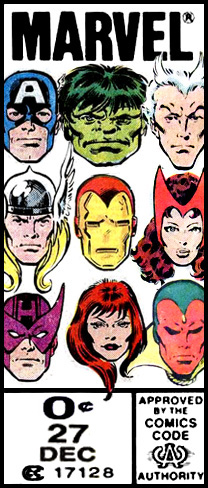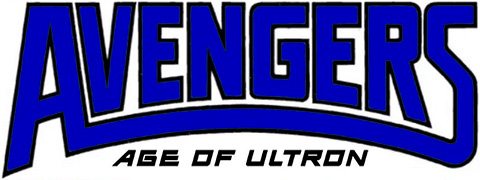

Stan Lee, Jack Kirby, [Joe Simon, Don Heck, Roy Thomas, John Buscema,] and Joss Whedon, 2015
#65, 2015 Skandies
I thought the first Avengers movie was one of the weaker entries in the Marvel Cinematic Universe up to that point—not as bad as Iron Man 2, but closer to it than to the first Iron Man movie, which is in a class by itself. This one isn’t much better than its predecessor. It’s an action movie stuffed full of bad action: too fast, too busy, too hard to follow, with the Avengers once again mowing down hordes of enemies that might as well be skeet (robots instead of aliens this time). There’s also an interminable hoo’d-win between Iron Man and the Hulk. As far as I’m concerned, this movie didn’t have much going for it other than the fact that it featured a bunch of characters I’ve been deeply attached to since about 1983. I started collecting the Avengers’ comic in the first place specifically in order to read about the Vision. I’m on record saying that Quicksilver was the fictional character I most related to as a teenager. And the main character in my Avengers-homage webcomic has more than a little in common with the Scarlet Witch. And here they all are! …And the movie versions are ciphers.
The filmmakers do a slightly better job with this movie’s Big Bad, who as the title suggests is Ultron—a character whose name I borrowed for my BBS handle back when I was twelve. Ultron has historically had the boring goal of destroying all organic life, and some writers have tried to dress this up a bit by at least giving him some philosophical reflections on the topic, which we do get here, though in one of the least Ultron-y voices I could have imagined. (The movie Ultron sounds like he should be asking what it’ll take to get you to go home in a new Kia Sportage today.) Ultron’s other big motivation over the years has been an Oedipal fixation on tormenting his creator, Hank Pym, who had yet to appear in the MCU when this movie hit the screen; that angle thus gets downplayed and transferred to Tony Stark. Fair enough! I suppose Stark the engineer is a more logical character to have created Ultron than Pym the biophysicist. Then there’s the third thing about Ultron: he evolves. He was Ultron‑5 when he first battled the Avengers; by the time I started reading comics, he was up to Ultron‑11. The movie tries to capture this aspect of Ultron as well, so points for that, but other than some minor aesthetic differences, he doesn’t actually change from one version to the next—nothing like the transformations I saw in my day, as Jim Shooter’s Ultron‑11, Doctor Doom’s slavish enforcer, was followed by Steve Englehart’s mawkish, family-obsessed Ultron‑12 and then by Ann Nocenti’s schizophrenic Ultron‑13. The movie is long enough that we could have had substantially different Ultrons in different acts; even better would have been if this were a TV show, and we got different Ultrons in different seasons. Which brings me to:
Agents of S.H.I.E.L.D. (seasons 1-2)
Stan Lee, Jack Kirby, [Jim Steranko, Brian Bendis, Gabriele
Dell’Otto, Len Wein, Neal Adams, Don Heck, Doug Moench, Rich
Buckler,] Maurissa Tancharoen, Jed Whedon, and Joss Whedon,
2013–2015
I think it may have been Stacey Tappan who first brought to my attention that the Marvel TV shows were actually integral parts of the MCU timeline; I had been hoping to ignore them because the first one I heard about was about, ugh, S.H.I.E.L.D. Rooting for Nick Fury and S.H.I.E.L.D. is like rooting for Nathan Jessup and Blackwater. Plus in the comics there’s really only been one S.H.I.E.L.D. story, which runs on a loop: oh noes, S.H.I.E.L.D. has been corrupted from within and must be disbanded and then reformed so it can be corrupted again, etc.! And indeed that is what we get here, with an eventual transition to the story of Brian Bendis’s insufferable character Daisy Johnson—think Stephen Ratliff’s Marrissa with Angelina Jolie’s face. This is probably not sounding like a rave review, but in fact I’ve enjoyed the series so far! Avengers: Age of Ultron was kind of a chore to get through, but Agents of S.H.I.E.L.D. very quickly got me into “well, just one more episode” mode and I blazed through it up to the point that it led into the Avengers movie. The characters may be B-list, but as a kid I bonded every bit as much with the obscure characters as with the big-name ones, and it’s been fun to follow the adventures of Mockingbird (even if she doesn’t go by that name on the show) and Mister Hyde (even if he doesn’t go by that name on the show) and the Inhumans (even if they’re random new ones instead of Crystal and Karnak and all a’ them). “Follow” may be the key word there—the fact that we follow them through a long series of installments, adding up to sixteen hours a year rather than two hours every two to three years, means that characters get to be in scenes that have room to breathe, and a chance to develop in a way that feels less forced. True, a lot of this development ends up being heel-turn / face-turn stuff that gets old after a while. But the sheer amount of quality time spent with the characters makes them land better than their A-list counterparts in the movies—and of course it helps that they belong to the Buffy family tree, on a show helmed a team that knows how to put together a Scooby gang. This crew actually got me to pull for Daisy Johnson, which is saying something. (Though I suppose that “making a character come off as less insufferable than Bendis did” is not a particularly high bar to clear.)
Agent Carter (season 1)
Stan Lee, Jack Kirby, [Devin Grayson, J.G. Jones,] Christopher Markus,
and Stephen McFeely, 2015
I also watched the first season of this, just because it’s part of the MCU and aired in 2015. It spins some new plot threads in the 1940s chunk of the MCU, and I suppose it’s well done, but as far as I’m concerned it’s also kind of a head-scratcher. So much source material to draw from, and this is the corner of the Marvel Universe you decide to explore? Like, I’m sure this was appointment television for Roy Thomas, but otherwise it seems like the target audience is people who are interested both in comic books and shows like Boardwalk Empire, and while I actually do fall into that overlap, I wonder how many other people do. I guess the fact that the S.H.I.E.L.D. show lasted seven seasons and this lasted two kind of answers that question.
|
|

|
|
|
 |
 |
 |
 |
||
|---|---|---|---|---|---|
Tumblr |
this site |
Calendar page |


